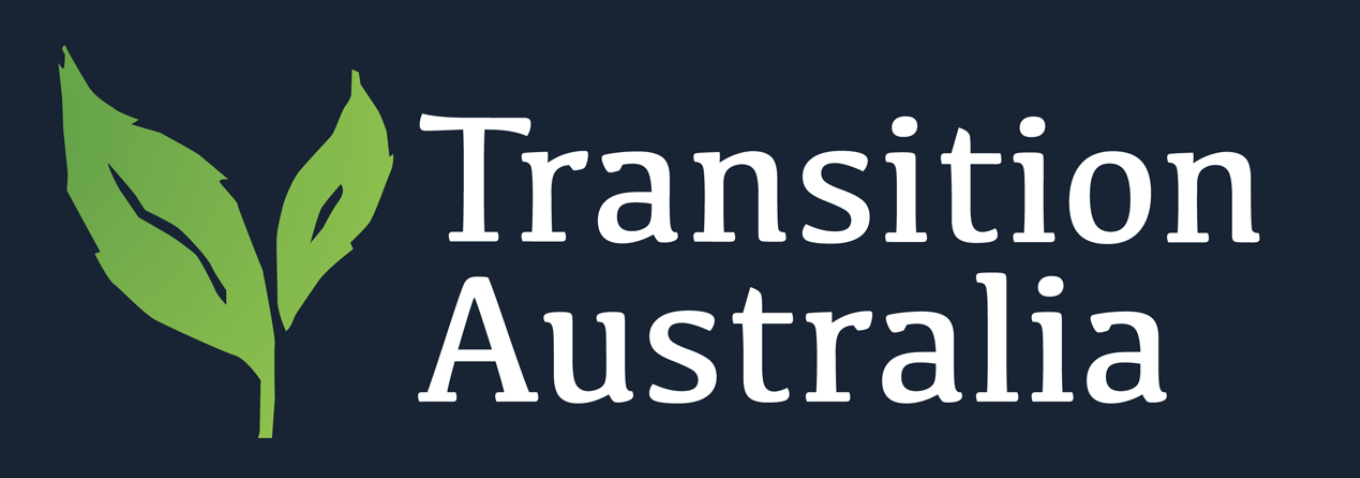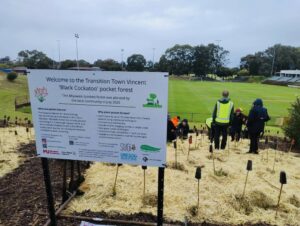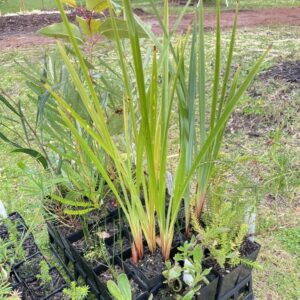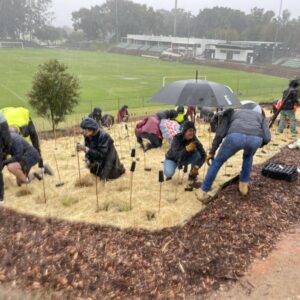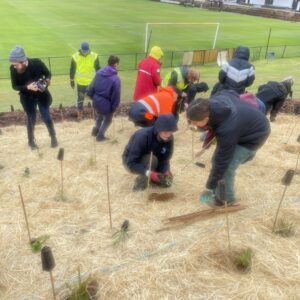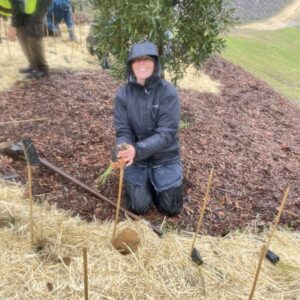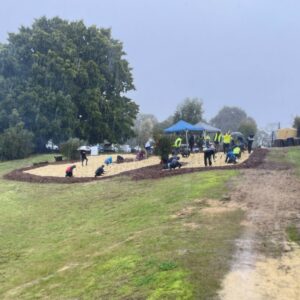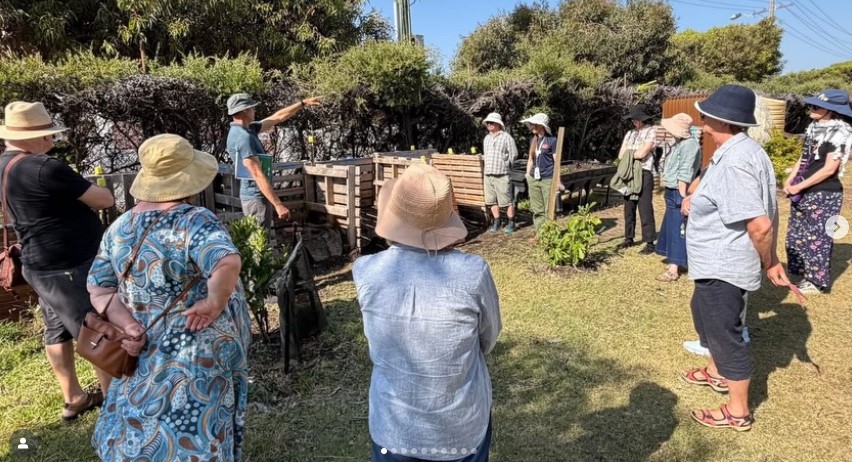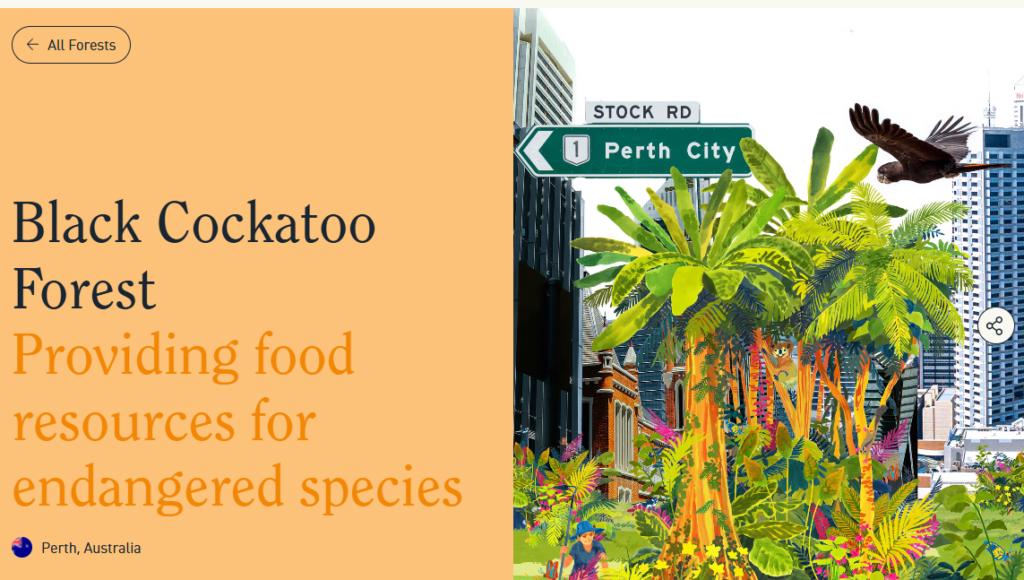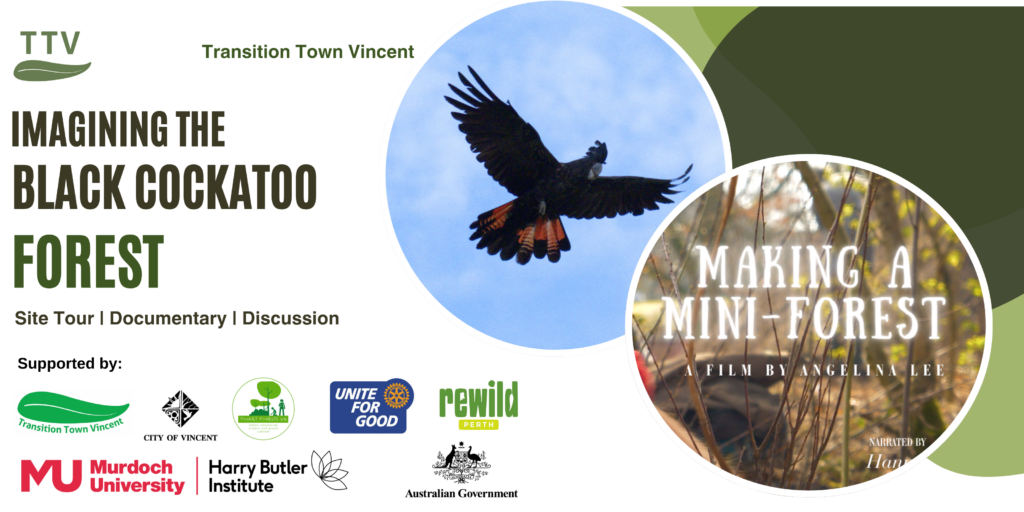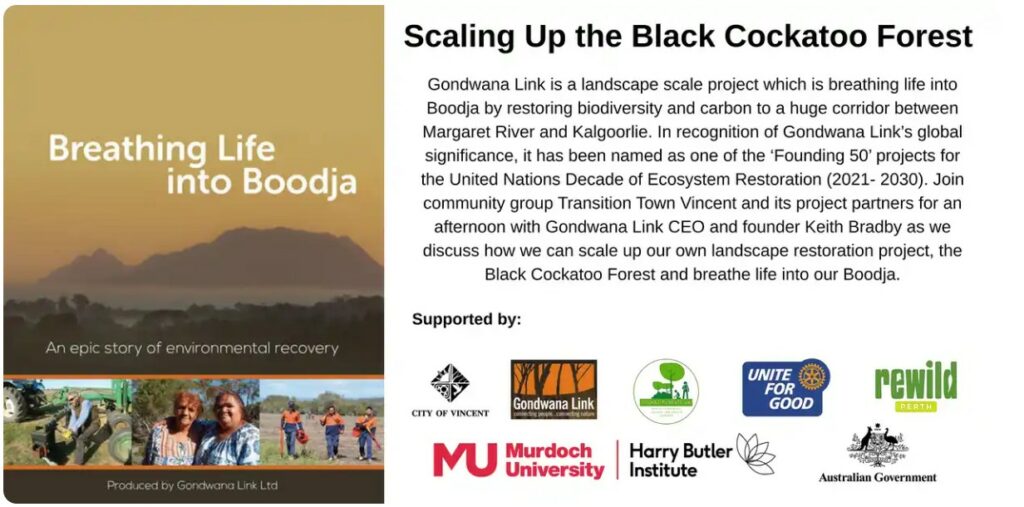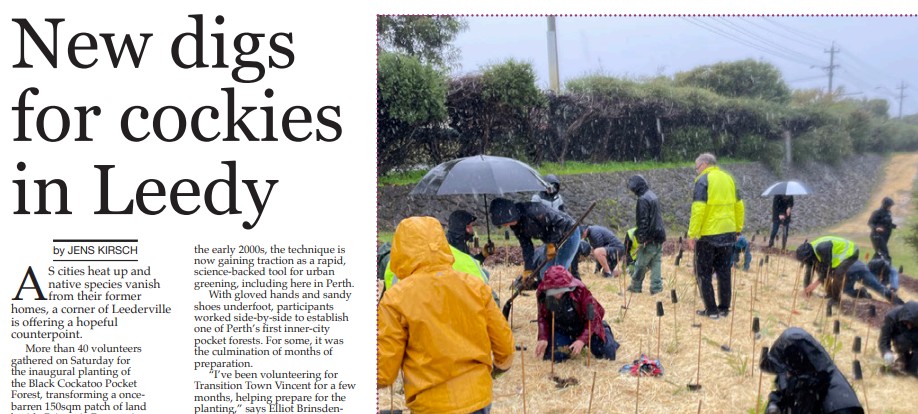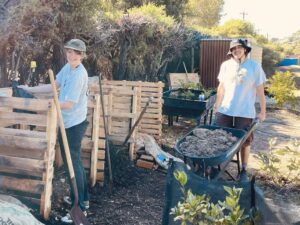Restoring the Black Cockatoo Forest to Boorloo Perth, pocket forest by pocket forest.
The Black Cockatoo Forest is a project initiated by community group Transition Town Vincent (TTV) and supported by Dr Grey Coupland and Murdoch University, SUGi Projects , the City of Vincent, Fasera biochar, Perth NRM and Rotary. Our aim is to restore the Black Cockatoo Forest to Boorloo Perth, pocket forest by pocket forest. We are doing this by empowering inner city residents and communities with the capacity to transform private and public spaces into habitat for Black Cockatoos while creating a cooler, healthier and more sustainable living environment.
Our initial focus is on growing a demonstration Black Cockatoo Pocket Forest on 150m2 of land allocated to us by the City of Vincent adjacent to the existing Britannia Community Food Forest (opposite the new skate space off Britannia Road, Leederville). This was established on 2nd August with a successful community planting attended by about 50 enthusiastic people (see photos below) who planted 500 natives including about 90 trees in pouring rain. The trees included 3 species of eucalypts and 5 species of banksia and 1 species of hakea (see plant list).
We are now moving to other phases including:
- Maintaining and monitoring the Black Cockatoo pocket forest (stage 1).
- Planning and implementing the interpretive trail.
- Establishing stage 2 of the Black Cockatoo pocket forest on a de-paved area nearby.
- Helping other groups in the inner city and elsewhere in Perth establish pocket forests.
We are seeking volunteers to assist in all aspects of the project. Email info@ttv.org.au with your name, phone number, number and age of volunteers.
Further information about the project is below.
Project NewsMaking a Black Cockatoo pocket forest demystifiedMaking a Black Cockatoo Pocket Forest Demystified was a short 3 hour capacity building course we ran on 4th December specifically targeted at coordinators or aspiring coordinators of community driven pocket forest projects. We had 11 people turn up and judging by the positive feedback, the course delivered on its objectives. We’ll definitely be delivering the course again early in the new year. These are some of the things people liked about the course:
The course notes can be found on this page. Email us at info@ttv.org.au to go on the email list for the next course. Black Cockatoo Forest featured on SUGi Projects websiteA major sponsor of the Black Cockatoo pocket forest at Leederville has been SUGi Projects. They provided significant funding for the project which is also contributing to ongoing monitoring and research into the site. SUGi’s vision is ‘Greening Cities & Reimagining Urban Life‘ which of course we share. Imagining the Black Cockatoo ForestSpeaking of greening cities and reimagining urban life, join us on Monday 24th November as we do just that. Find out more here.
Scaling up the Black Cockatoo ForestJust a reminder to join us this Monday 13th October in Leederville for a discussion with Gondwana Link founder Keith Bradby on how to scale up the Black Cockatoo Forest project. The event will feature an inspiring documentary about Gondwana Link – Breathing Life into Boodja – a presentation by Keith and a panel discussion with our project partners: Grey Coupland Catriona Ferrie Steve McCabe Alex Castle Keith Bradby *feel free to come for all or part of this event. https://events.humanitix.com/scaling-up-the-black-cockatoo-forest-a-discussion-with-keith-bradby
Can we make it? Yes we can!We did it. In less than 6 months TTV and the community were mobilised to make a Miyawaki pocket forest for Black Cockatoo’s! Together with about 50 other people we/you were able to produce co-compost biochar, identify and order the required 501 seedlings and then plant them in an area of 150 square metres while braving the torrential rain. You can read the highly informative two page spread prepared by Jens Kirsch which was published in the online version of the Voice newspaper here (page 11) |
Project information
Background
The origins of the Black Cockatoo Forest can be traced back to two events which TTV hosted in 2024. The showing of the documentary Black Cockatoo Crisis highlighted the plight of Black Cockatoo’s across south western Australia and in particular the ongoing loss of habitat and associated tree canopy cover in urban Perth. Subsequently some of our members heard Dr Grey Coupland talk on ABC radio and were so inspired we hosted Grey to talk to the local community about her program at our Pocket Forest’s for the Inner City event in September 2024.
The TTV My Healthy Soils Project then teamed up with Dr Grey Coupland to establish the Black Cockatoo Pocket Forest using the Miyawaki/Pocket Forest methodology which she has adapted to SW Western Australia conditions. Grey is an ecologist at the Harry Butler Institute, Murdoch University where she created the Miyawaki Forest Outreach Program. Since 2021, the program has brought forests and a dedicated citizen science program to about 17 schools, as well as four community forests in Perth and surrounds. Her forest funding partners are Carbon Positive Australia and SUGi.
Specific objectives of the Black Cockatoo Forest project are:
- To provide residents and others with a local demonstration of how to restore above and below ground carbon and biodiversity with a focus on providing habitat for Black Cockatoo’s.
- To build the capacity for residents and others to restore soil carbon and biodiversity in inner city yards and courtyards.
The site will provide a local demonstration of how to restore above and below ground biodiversity and soil carbon using the principles developed by Dr Akira Miyawaki and adapted to Perth conditions by Dr Coupland. It will also provide a training ground for those residents and others who want to establish a pocket forest in their yard or courtyard as part of their My Healthy Soils Project. Pocket forests:
Three basic features of Miyawki/Pocket Forests:
- Plant locally native species
- Soil remediation
- Plant at a high density
Miyawaki Pocket Forests:
- Can be achieved with as little as 3 square metres of area
- Contain 3 to 5 native plants per square metre
- Reach maturity up to 10 times faster than traditional planting methods
Plant locally native species
In accordance with the Miyawaki methodology we will be planting locally native species. The location of the Black Cockatoo Forest is on an area which is part of the Spearwood soil-landscape system and the pre-settlement vegetation seems to have been a mix of Karrakatta vegetation complex and the Herdsman vegetation complex. The Karrakatta vegetation is represented by the type of vegetation found at Kings Park, about 2.5 kilometres away. There are many plant species in Kings Park which Black Cockatoo’s use for foraging and roosting.
Soil remediation
A key part of the Miyawaki methodology is soil remediation. This is done by making compost with biochar and using it to build up the soil organic matter and carbon before planting and colonising it with microbes from nearby bushland. A major point of difference to other Pocket Forests established in Perth will be the use of co-composted biochar in the initial soil preparation which will provide the resistant carbon e.g. charcoal and humus similar to that found in natural soils. The site will also be colonised with soil organisms (e.g. bacteria, fungi) from nearby bushland. In this way, restoration of the soil carbon and biodiversity will receive similar attention to the above ground carbon and biodiversity.
Plant at high density
We will be planting the forest at a density of 3 plants per square metre. This is quite a bit higher than normal landscaping practices but is lower than what you may find say at Kings Park. We will also be planting predominantly tree and shrub species as opposed to groundcovers or sedges/grasses. The purpose of this is to force the plants to compete for light which then forces growth upward. Along with the soil remediation, this results in high growth rates.
Schedule of activities
Stage 2 – Depave and revegetate an old bitumen parking area 2026
We have received funding from the City of Vincent to purchase plants for Stage 2 of the project which involves depaving a disused bitumen parking area and then revegetating it with Black Cockatoo pocket forest.
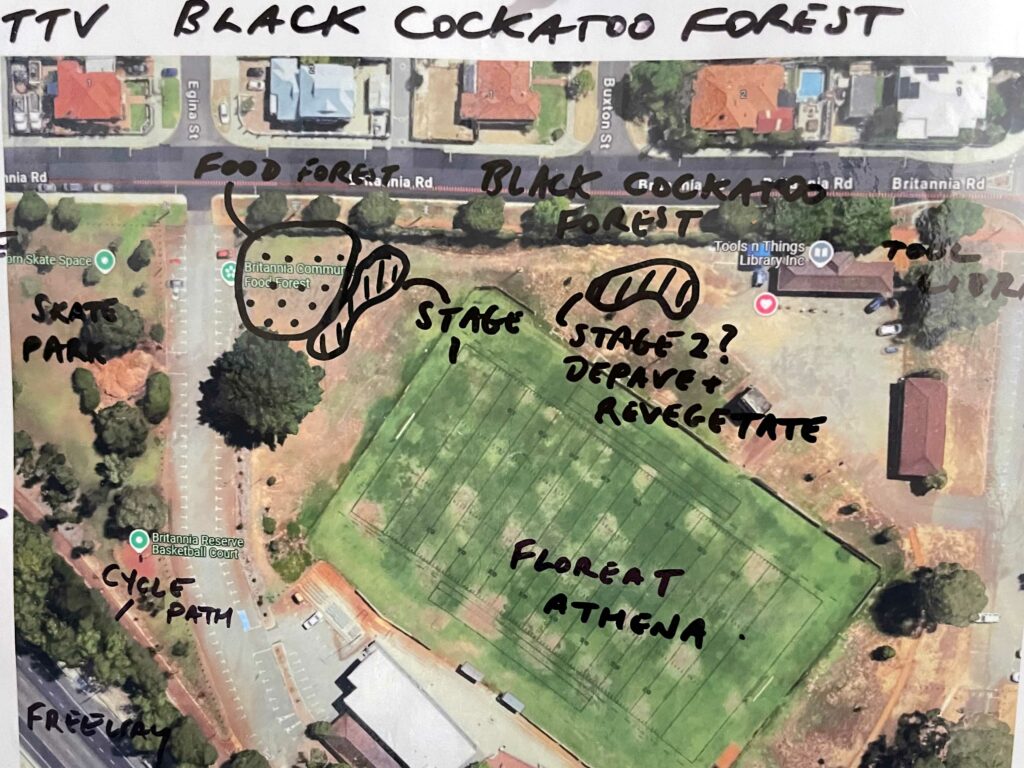
Volunteering opportunities
There are lots of volunteering opportunities with this project and the associated community food forest. These include:
- Composting with the Compost Crew
- Maintenance including weeding, mulching around the plants
- Feeding the worms in the worm farm
- Making things such as raised beds, signs etc.
- Providing technical advice
- Marketing and communications
Please email Ian at info@ttv.org.au with your contact details and what you are interested in.
More information
For more information about pocket forests check out this website, video or listen to this podcast. This series of videos provides a very good overview of the process.
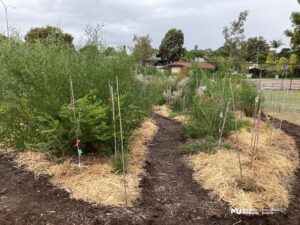
The Eddystone Primary School Pocket Forest site after 22 months
#blackcockatooforest
